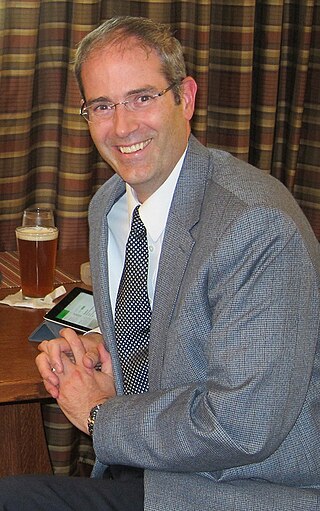Related Research Articles
Neil Leon Rudenstine is an American scholar, educator, and administrator. He served as president of Harvard University from 1991 to 2001.
The Five Colleges of Ohio, Inc. is an American academic and administrative consortium of five private liberal arts colleges in the state of Ohio. It is a nonprofit educational consortium established in 1995 to promote the broad educational and cultural objectives of its member institutions.

The National Institute for Technology in Liberal Education (NITLE) was a "community-based, non-profit initiative" to "help liberal arts colleges and universities integrate inquiry, pedagogy, and technology". It was established in September 2001.
The Andrew W. Mellon Foundation of New York City in the United States, simply known as Mellon Foundation, is a private foundation with five core areas of interest, and endowed with wealth accumulated by Andrew Mellon of the Mellon family of Pittsburgh, Pennsylvania. It is the product of the 1969 merger of the Avalon Foundation and the Old Dominion Foundation. These foundations had been set up separately by Ailsa Mellon Bruce and Paul Mellon, the children of Andrew Mellon.

William Gordon Bowen was an American academic who served as the president emeritus of The Andrew W. Mellon Foundation, serving as its president from 1988 to 2006. From 1972 until 1988, he was the president of Princeton University. Bowen founded the digital library, JSTOR.
The Marianna Brown Dietrich College of Humanities and Social Sciences is the liberal and professional studies college and the second-largest academic unit by enrollment at Carnegie Mellon University in Pittsburgh, Pennsylvania, USA. The college emphasizes study through rigorous analysis and technology of the behaviors, institutions, and beliefs that constitute the human experience, describing itself as “not an ordinary liberal arts school.” The college was named for Marianna Brown Dietrich, the mother of philanthropist William S. Dietrich II, after his donation of $265 million to the university in 2011 – the largest single donation in Carnegie Mellon history.
Earl Lewis is the founding director of the Center for Social Solutions and professor of history at the University of Michigan. He was president of the Andrew W. Mellon Foundation from 2013 to 2018. Before his appointment as the president of the Andrew W. Mellon Foundation, Lewis served for over eight years as Provost and Executive Vice President for Academic Affairs and as the Asa Griggs Candler Professor of History and African American Studies at Emory University. He was the university's first African-American provost and at the time the highest-ranking African-American administrator in the university's history.
The Institute for Citizens & Scholars is a nonpartisan, non-profit based in Princeton, New Jersey that aims to strengthen American democracy by “cultivating the talent, ideas, and networks that develop lifelong, effective citizens.” It administers programs that support civic education and engagement, leadership development, and organizational capacity in education and democracy.
Established in 1988, the Consortium of Humanities Centers and Institutes serves as a site for the discussion of issues germane to the fostering of cross-disciplinary activity and as a network for the circulation of information and the sharing of resources within the humanities and interpretive social sciences. CHCI has a membership of over 200 centers and institutes that are remarkably diverse in size and scope and are located in the United States, Australia, Canada, China, Korea, Finland, Taiwan, Ireland, United Kingdom, and other countries.
The Franklin Humanities Institute (FHI) is an interdisciplinary humanities center at Duke University dedicated to supporting humanities, arts, and social science research and teaching. Named after the prominent African American historian and civil rights activist John Hope Franklin, who retired from Duke in 1985 as the James B. Duke professor of history, the institute has also made a commitment to promote scholarship that enhances social equity, especially through research on race and ethnicity.
Bernard Osher is an American businessman, best known for his work as a philanthropist.
Davis Schneiderman is an American writer, academic, and higher-education administrator. He is a professor of English and Krebs Provost and Dean of the Faculty at Lake Forest College in Illinois. Prior to that appointment, he served as Associate Dean of the Faculty for Strategy and Innovation.

Ira H. Fuchs is an internationally known authority on technology innovation in higher education and is a co-founder of BITNET, an important precursor of the Internet. He was inducted into the Internet Hall of Fame in 2017. Since 2012 he has been President of BITNET, LLC a consulting firm specializing in online learning and other applications of technology in higher education.
The Walter Chapin Simpson Center for the Humanities, located in Seattle, Washington, is one of the largest and most comprehensive humanities centers in the United States. Housed in the College of Arts and Sciences at the University of Washington (UW), it offers UW scholars a spectrum of local opportunities for intellectual community and grant support that advances crossdisciplinarity, collaboration, and research while networking them nationally and internationally.

The Open Library of Humanities is a nonprofit, diamond open access publisher in the humanities and social sciences founded by Martin Paul Eve and Caroline Edwards. Founded in 2015, OLH publishes 27 scholarly journals as of 2022, including a mega journal, also called Open Library of Humanities, which was modeled on PLOS but not affiliated with it.

George Sumner Bridges is an American sociologist and academic administrator who served as the president of The Evergreen State College from October 2015 through June 2021.

John C. Knapp is an American academic administrator serving as the 13th president of Washington & Jefferson College in Washington, Pennsylvania. Previously, he served as 12th president of Hope College, a private Christian liberal arts college located in Holland, Michigan.

Christopher P. Long is an American academic, Professor of Philosophy and current Dean of the College of Arts & Letters and the Honors College and MSU Foundation Professor at Michigan State University. He is the author of four monographs, the co-founder of the Mellon-funded Public Philosophy Journal, a primary investigator on the Mellon-funded HumetricsHSS grant, and an advocate for open access.

Katherine Anandi Rowe is an American scholar of Renaissance literature and media history. She was named the twenty-eighth president of the College of William & Mary on February 20, 2018. She began her service on July 2, 2018 succeeding W. Taylor Reveley III, who had served as president since 2008. After seven months in office, Rowe was formally inaugurated on February 8, 2019 as part of the university's annual Charter Day ceremony.

Gene Andrew Jarrett is an American professor, literary scholar, and academic administrator. He is Dean of the Faculty and William S. Tod Professor of English at Princeton University.
References
- 1 2 3 4 5 6 7 8 9 10 11 "English Department Faculty, William Pannapacker". Hope College. Retrieved 2016-08-12.
- ↑ "Program History - Mellon Scholars Program". Program History - Mellon Scholars Program.
- ↑ Pannapacker, William (18 February 2013). "Stop Calling It 'Digital Humanities'" – via The Chronicle of Higher Education.
- ↑ Jacob. ""Defining" Digital Liberal Arts – Digital Scholarship: Projects & Pedagogy".
- ↑ Box 9000, Contact Hope College PO; Holl; work 616.395.7000, Michigan 49422-9000. "William Pannapacker to Direct GLCA Digital Liberal Arts Initiative". William Pannapacker to Direct GLCA Digital Liberal Arts Initiative.
{{cite web}}: CS1 maint: numeric names: authors list (link) - ↑ Scholarship, ILiADS-The Institute for Liberal Arts Digital. "Committees".
- ↑ Box 9000, Contact Hope College PO; Holl; work 616.395.7000, Michigan 49422-9000. "Grant to Support Faculty and Students in Interdisciplinary Exploration of "Grand Challenges"". Grant to Support Faculty and Students in Interdisciplinary Exploration of “Grand Challenges”.
{{cite web}}: CS1 maint: numeric names: authors list (link) - ↑ "GRANT FUNDS PROGRAM TO FOSTER COLLEGE-COMMUNITY PARTNERSHIPS BECAUSE "THERE'S NO PLACE LIKE HOME"".
- ↑ Benton, Thomas H. (12 June 2011). "100 Columns Later" – via The Chronicle of Higher Education.
- ↑ Benton, Thomas H. (3 June 2003). "So You Want to Go to Grad School?" – via The Chronicle of Higher Education.